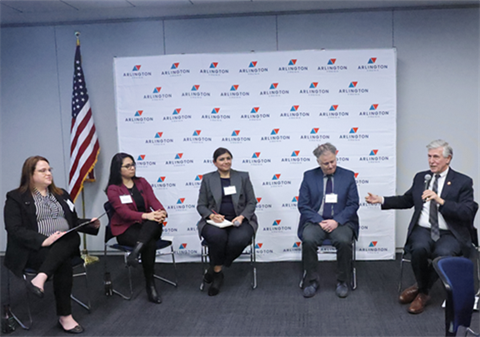AED Hosts Artificial Intelligence (AI) Technologies Executive Panel
April 17, 2024

On February 20, the VT Basic Research Innovation Collaboration Center (BRICC) hosted an Executive Panel discussion organized by the Air Force Research Lab’s (AFRL) Civic Leader Program and Arlington Economic Development (AED) on the opportunities presented by the recent explosion of Artificial Intelligence (AI) technologies. The BRICC, located in Arlington’s Ballston neighborhood, has a mission to foster collaboration between the Air Force Office of Scientific Research (AFOSR) and commercial entities. As such, this meeting was a great opportunity for these groups to work together for the first time.
The AFRL Civic Leader program aims to build a group of informed and well-connected advocates that advise and collaborate with AFRL leadership. Arlington Economic Development is a department within Arlington County government whose mission is to help Arlington thrive as an economically vital community by providing leadership and services to Arlington’s business, real estate, tourism, and cultural affairs sectors.
The Executive Panel event was an opportunity for AED, VT-ARC, and AFRL Civic Leader Program to collaborate and outreach to companies in Arlington and Northern Virginia, and to provide a forum for forty business executives to network with each other, and with AFRL and VT-ARC’s industry leads.
Dr. Amanda Bullock, AI lead for AFRL, moderated the panel discussion, titled “Impact of AI on American Industry, Jobs and Technological Competitiveness.” This topic was chosen due to its current place at the front of the national consciousness, and its potential impacts on government and business.
Representative Don Beyer of Virginia’s 8th Congressional District, led the discussion and shed light on the legislative front. He provided examples of how Capitol Hill utilizes AI to manage the influx of public correspondence, showcasing a practical application of AI in governance. The discussion also touched upon the ethical considerations surrounding AI development, emphasizing the necessity for robust laws to address potential legal issues, including copyright protection and the proliferation of false advertisements and defamation campaigns.
Panelists also included industry experts such as Dr. Viveca Pavon-Harr, Chief Data Scientist & Director of Applied Intelligence Discovery Lab at Accenture Federal Services and Dr. John Kaufhold, a Machine Learning innovator. The panelists compared the United States' stance on generative AI software with other nations, emphasizing the importance of regulatory measures to maintain competitiveness. Moreover, they examined AI's impact on end-users, assuaging concerns about job displacement while acknowledging its transformative potential in streamlining mundane tasks and promoting personal health tracking. Dr. Kamaljeet Sanghera, Executive Director of the Institute for Digital Innovation at George Mason University, discussed how higher education institutions are preparing students for a future heavily influenced by AI.
The panel discussion highlighted the dynamic nature of AI's influence, spanning policy, industry and other spheres. The partnership between AED, AFRL Civic Leader Program, and the BRICC shows a commitment to informed decision-making and open dialogue between stakeholders when it comes to harnessing the transformative potential of emerging technologies.